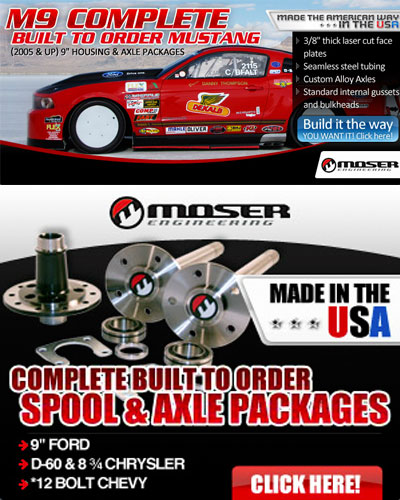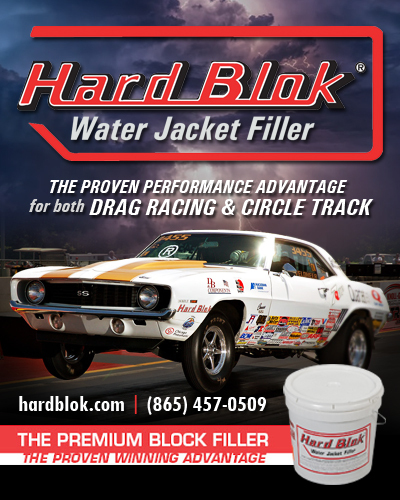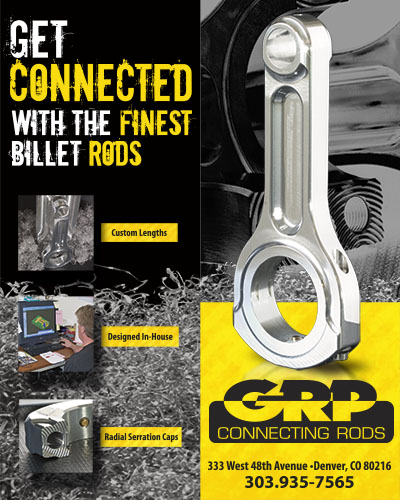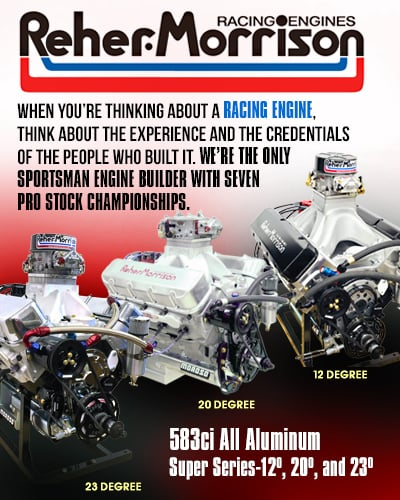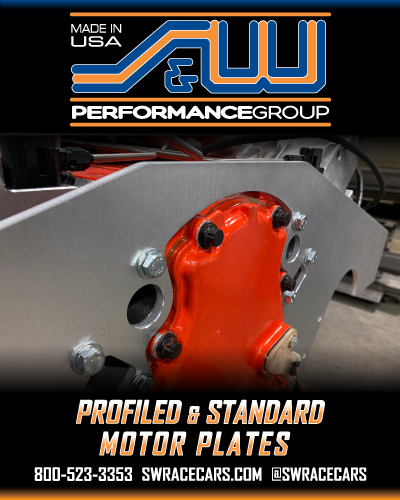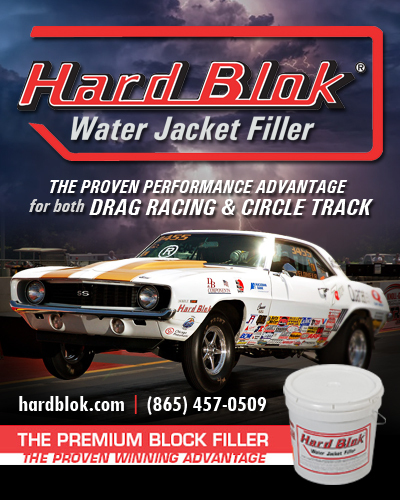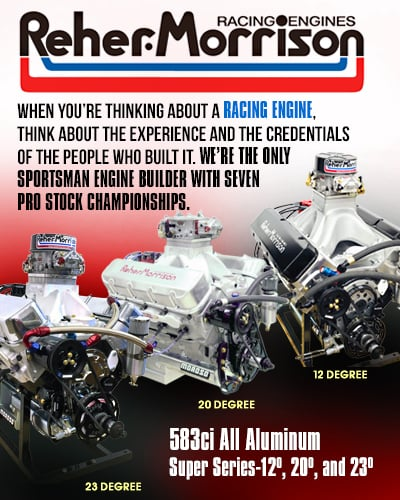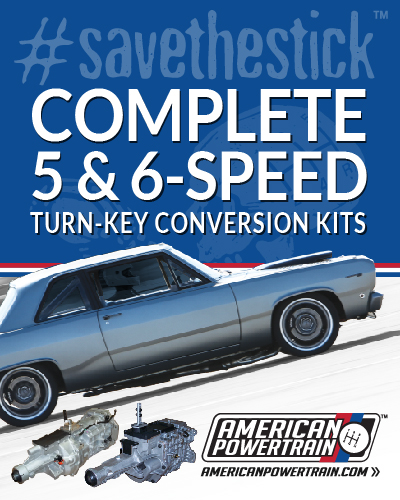OEHLER GETTING CLOSER TO CONSISTENT PERFORMANCE
 Ryan Oehler was in a stiflingly hot attic when he received a phone call that changed his life.
Ryan Oehler was in a stiflingly hot attic when he received a phone call that changed his life.
He was working for his family’s AirTech Inc. heating and cooling company, dreaming about how he and his father, Brad, just had “to go to the big time,” meaning the NHRA’s Pro Stock Motorcycle class. As he repaired a blower motor on an air handler in the hood, he dreamed of racing glory.
He remembered thinking about his American Motorcycle Racing Association Pro Mod Harley comfort zone and wanting to break out of it: “We don't want to kill the guys in Pro Mod, because we already beat them all. They're all like, ‘Ugh – Ryan's here.’” After all, Oehler had scored back-to-back AMRA Pro Mod Harley championships (2015-16), and he still owns that class’ elapsed-time record (5.227 seconds) from Rockingham Dragway in 2016. “They just didn't like that I was young and being so successful. You can just see it in all these older guys’ faces: ‘He’s a good kid, but damn him, he's just too fast.’” That’s why he said he was thinking, “I got to make it. How are we going to do it?”
So there he was in the attic of a really old house and he could have sworn the thermometer read 140 degrees. The phone rang, and it was George Bryce, Maestro of Motorcycle Success Stories, on the line. “I’d been bugging him,” Oehler said.
“He finally said, ‘Ryan, I’ll make you a deal. If you can come up with [an undisclosed] amount of money and then pay me off over the next year, Jackie and I want to help you, and we’ll put you on a Pro Stock motorcycle. Forget the temperature – that was the hottest thing in Ryan Oehler’s day.
“So I made the deal, he said. “I took every dollar of my existence to give to them to start the deal, and then I walked out of the attic going, ‘Oh, what am I doing?! How am I going to come up with the rest of this money?!’”
Oehler, who now is only 36 years old, was no stranger to financial pressure. Already, he said, he had gotten to the point “when you max out all your credit cards 10 years in a row, take out loans, and sell your house to yourself back to your business you started and then back to yourself again, just to keep sucking money out of it to feed your operation.” When he started his Pro Mod Harley program, he said, he “took out $30,000 in school loans – and it was the smartest thing I could have ever done. Three-percent interest, I didn’t have to start paying till I graduated, and they just gave me $35,000 cash. I was like, ‘Oh, this is great.’ I wish I’d taken out more.”
He rode the Bryces’ bike and after a year, Oehler said, “it's all ours. Then we eventually ended up buying out their operation and we've developed it into our own program now. And it gave us a real leg up, because coming in with stuff that had already been pretty much hammered out but yet not taken to the next level, was a lot easier than taking on brand-new stuff and figuring out that path. We would have gotten there, but this helped expedite it. Now here we are, and it's all our own engines. It’s all our own program. It's me and my dad, and we're making good horsepower and now we're winning.”
Until Angelle Sampey spoiled his distinction with her Aug. 9 victory at the Dodge Indy Nationals, Oehler could boast that he had the only Pro Stock Motorcycle victory at Indianapolis that wasn’t at a U.S. Nationals.
But he had something to make up for losing his bragging rights. He had self-assurance once again.

Just before he began his successful quest for his first Pro Stock Motorcycle victory, at the E3 Spark Plugs Nationals at Indianapolis, Ryan Oehler asked a question that might never have been asked before in drag racing.
“Who’s going for a ride? Is Jesus going to go for a ride? I know He likes to go fast,” Oehler said.
The Bible – in the Book of Isaiah, Chapter 19, Verse 1 – does say, “The Lord rideth upon a swift cloud.” So maybe He does like to go fast. Oehler was convinced, even without scriptural evidence.
“Of course Jesus likes to go fast,” the entertaining racer said with authority. “We do a prayer before every run, and we've got a lot of people that have been friends or family or fans . . . there's a lot of people reaching out to you that may have some health problems. Then six months later you meet their families saying, ‘He’s passed, but he was really a huge fan of yours.’ I say, ‘You know what? You tell them to tell Jesus you're going for a ride. Tell Jesus to scoot over because it’s your turn. He’s been racing with me now for too many runs.’”
Right before the second Pro Stock Motorcycle appearance of the season, at the Dodge Indy Nationals, Oehler’s friend, a fellow nicknamed “Cheeseburger,” passed away.
Oehler said, “He was a huge supporter of mine, but his name is Cheeseburger for a reason: he's a big guy. I said, ‘You know what, Cheeseburger? You’re going to have to sit this one out. They may let you fly in the helicopter. You tell Jesus you’re just too damn big still to race on the back of the bike.’ He’d appreciate it, though.
“We always just try to thank everyone that's been behind us, think of everyone that supported us and try to bring a little bit of humor to it even in some bad situations, because their friends and family want you to be happy and at that point they also want to see you succeed, I hope,” he said. “I've had a lot of people that we're former competitors and people that you've got to pay your dues and I swear that they've been up there [in Heaven], poking me.”
For example, he said, “I missed a national record on my Pro Mod Harley by one-thousandth of a second. We left the tow strap on the bike. You could hear the tow strap. That cost us a thousandth of a second. That’s someone just picking on me. So we definitely paid our dues, and it's all just part of it.” - Susan Wade
It returned partly because he had been prepared in that final round at Indianapolis against three-time series champion Matt Smith. Oehler’s bike had a problem, and he knew it – and he had a plan for how to deal with it.
“The bike starts dragging because the clutch is hitting. As soon as you give it gas or you got the clutch lever pulled in but you throttle up, it pulls you forward. So I had to improvise at that moment, knowing that when I go up on the two-step at the starting line that it's going to try to pull me through the beams – and it did. But I was prepared and at that point, I didn’t care about what Matt’s supposed to do. I knew I had my own problem, and then it all worked out. His was a bigger problem. You couldn’t improvise that. In our defense, though, other than luck, I was prepared. I knew it was going to do that. I had a plan I acted on immediately,” Oehler said, “and my confidence level was through the roof.”
In his AMRA heyday, Oehler described his mood as almost invincible:
“You're on this real successful wave. You can feel it. You're pulling up to the line. And I'm beating that guy – it doesn't matter, you're beating him.
“Now, finally, at this point, we have that same feeling,” he said. “Now that we've won, we know we're competitive. We know we're fast. Say what you want to say about any luck that came into the [E3 Spark Plugs Nationals, where he won], but there's luck at every race. But we were the quickest of the semifinals of the heaviest hitters here. So that feels really good.”
He said he’s getting that same sense of accomplishment now as he looks ahead to the Sept. 3-6 U.S. Nationals at Lucas Oil Raceway at Indianapolis.
His rise to drag racing’s elite level is a journey he and his dad have shared every step of the way. Actually, it began before Ryan Oehler was born.
“It took the combination of both of us together and our team to really get to here. It wasn't something he could do on his own. He tried,” the son said.
“My dad started in this in the ‘70s in Pro Stock cars and he was building a Pro Stock Monza and they got the rig, they got the car. They had been building the car for three-and-a-half years and then the car went from the Monzas then the Vegas to the Camaros. So his entire car is junk,” Ryan Oehler said. “So he's really discouraged. He calls the NHRA headquarters and he gets Wally Parks on the phone in the ‘70s and Wally Park says, “Brad, have you ever thought of entering the sportsman classes?’ It just pissed my dad off so bad. He [Parks] goes, ‘When we tell a pro to build a car, we don't tell them to do it in three or four years. They do it in six months.’
“So at that point my dad kind of realized that he was really discouraged but he was pretty outclassed at that time. Very smart, very capable, but financially we were never going to be there. So that's when we got into motorcycles. My dad shifted his entire operation, sold his entire trailer. He sold the truck. He went and bought a brand-new Chevy van and went and bought a brand-new Harley Davidson Super Glide. He sold every part off of it within 500 miles. In the late ‘70s, early ‘80s, you don't take a brand-new Harley and sell all the parts except for the cases and the frame, because it was a sought-after thing,” he said. “So everyone thought he was crazy, and then he ended up having the fastest gas Harley in the world in the late ‘80s.
“Then I'm born in 84,” Oehler said, “so I'm a part of all this coming up, watching, and I wanted it bad. I told everybody we had either a winning championship or record holder drag bike in every class of the all Harley Racing Association in the late 80s. So we were dominating and I'm sitting here, there's six drag bikes in our shop and I'm five years old and it is the coolest thing ever and I want to do that. So they gave me the poison very young. Then as I grow up, I'm supposed to stay away from motorcycles: ‘We don't want you racing motorcycles. We want you racing cars.’ Well, that just didn't last, I just had to do it.
“About 2007, I started building my first pro-Harley, which is like the little brother to a Pro Stock bike: seven-inch tire versus a 10-inch tire, 113-cubic-inch motor versus 460-cubic-inch motor. Once we did get there, we came out and got our asses handed to us for about five years, and then we became dominant and we won every single race in 2016, except for the first race of the year. I red-lit in the finals. Otherwise, we would have swept the whole season,” he said.
“It's real cool, because you’ve got all the Top Fuel Harley guys over here, and they've all seen me because I was always in their family of the All-Harley Racing Association. Now, being pitted across from everybody, they can all remember and think back . . . ‘You've done really well to get where you're at.’
His current bike, Oehler said, “has performance in it. We tested with no changes, other than we put the C motor in and we went quicker in testing last week than we did all week in Indy. We put our third-best motor in it, and we went quicker than any run we made at Indy, and the weather was similar. Try to put together the best run you can it and don't make big changes. Now we're close. So now it's just fine-tuning.”
Oehler has grown light years since last season. The difference, he said, is paying attention to details.
“Last year, looking back, what we messed up on was we couldn't capitalize on those moments,” he said, “and it wasn't because of a mechanical failure. Something little happened and we just missed it. And then you go up there and the class runs a 6.80 and you run a 6.90 and you're like, ‘What the hell?’ Then you find out I did this or this. Anytime that you needed that opportunity you missed it so now you qualify 11th instead of sixth. That’s what professional teams do. They don't miss those opportunities to capitalize.
“I'm really starting to pull it out of my bank of knowledge, and I'm really learning a lot of the little details that add up to what's really important, “Oehler said. “When you're already fast and you can run within this small margin of a window, you've got to be always thinking, ‘What's next?’”
He’ll find out soon enough.
























